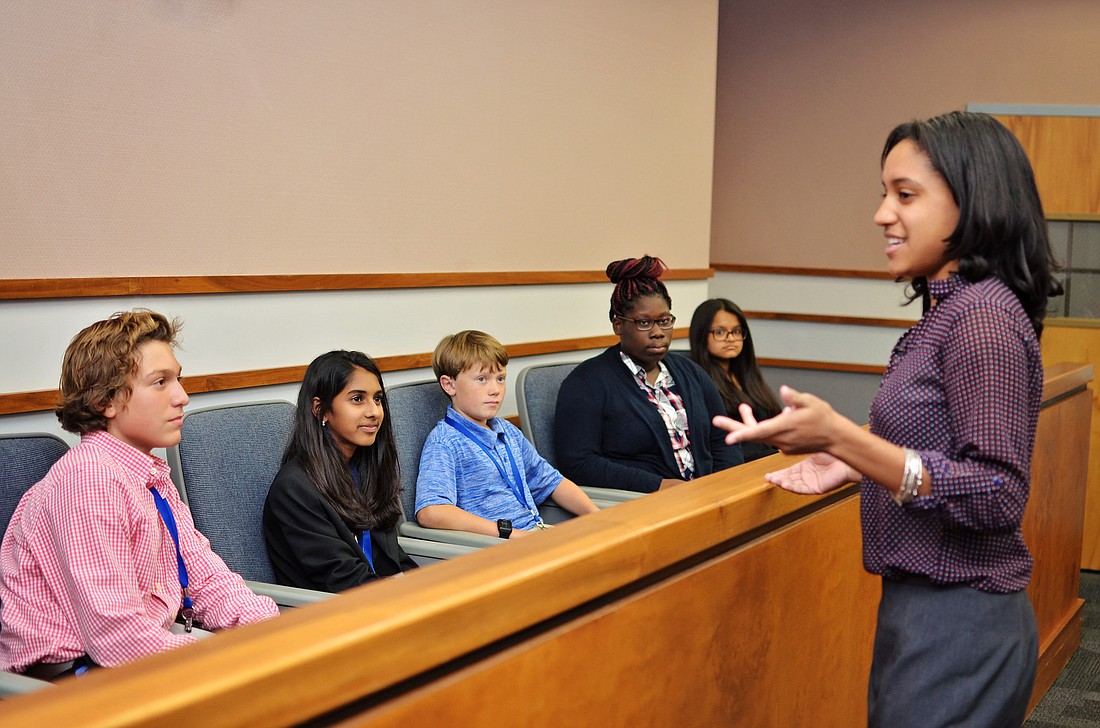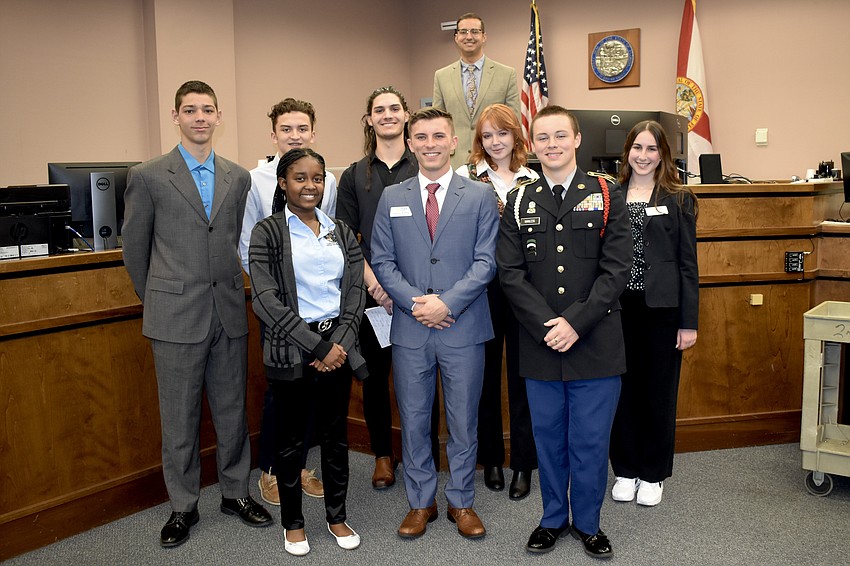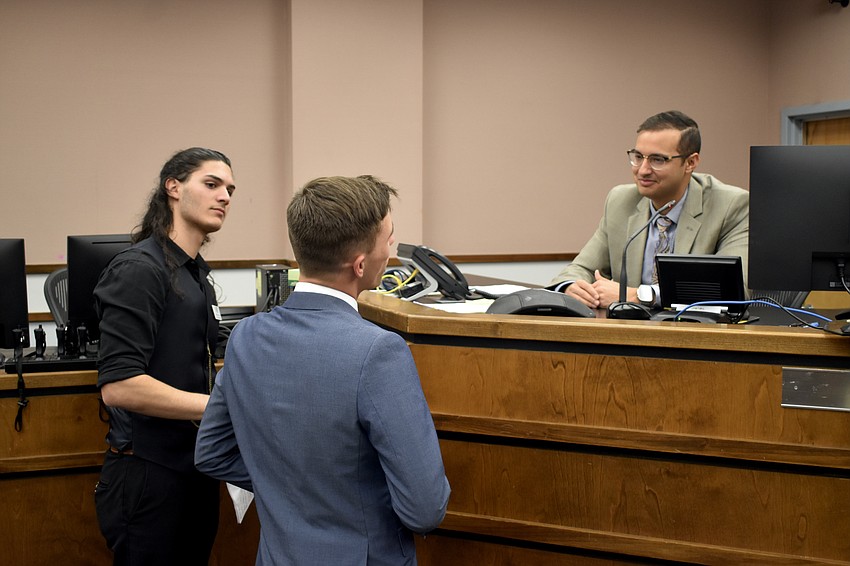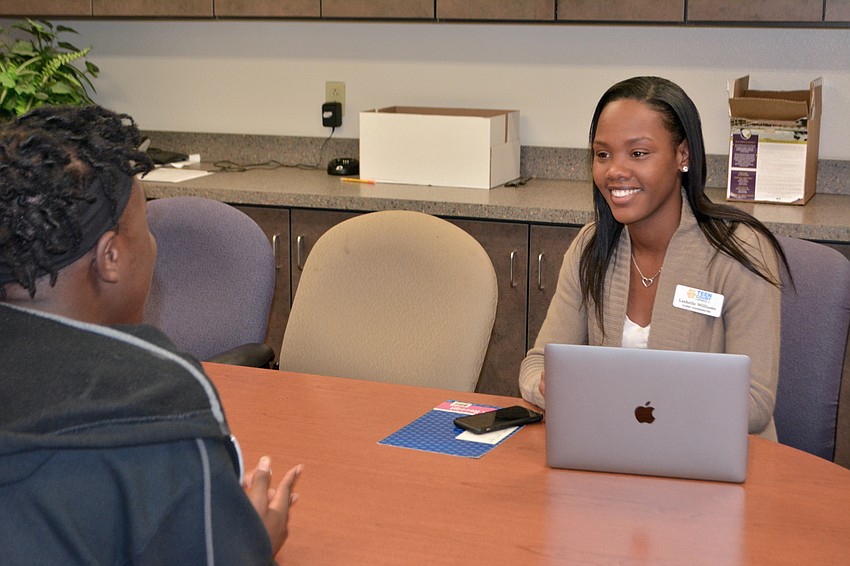- April 29, 2024
-
-
Loading

Loading

The attorney takes a probing approach to the defendant at the witness stand, a teenager.
If the defendant had never drunk alcohol before, the attorney asks, how did the defendant know how much it was possible to consume without becoming intoxicated?
It sounds like an ordinary courtroom scene, but for the defendant, it may feel very different. The prosecuting and defending attorneys, jury, bailiff and clerk are all teens.
If a suspect admits to a charge, those ages 8 to 18 with a misdemeanor or low-level, nonviolent felony charge can undergo a trial through Teen Court, a Sarasota nonprofit focused on offering a second chance to young people.
It may seem like a novel concept that a courtroom staffed entirely by teens can legally serve a role in the community, and yet it's a model that has been increasingly employed in many jurisdictions in the U.S.
The nonprofit has existed in Sarasota County since 1988, when it was established with the support of the senior deputy court administrator, 12th Judicial Circuit Court, law enforcement agencies, the State Attorney’s office and the county.
“It was unheard of, to give young people this responsibility and this opportunity,” said Teen Court Executive Director Heather Todd.
The program became the first in Sarasota, and today is one of two such programs to operate as a nonprofit, rather than as a government entity.
The program offers a real legal process which assigns binding consequences, but it also teaches something to its teen attorneys as well about the nature of law.
Shailee August is a teen attorney who is an 11th grader at Riverview High School and plans to go into either forensic psychology or neuroscience. She found herself impressed with the authenticity of the experience.
“You automatically assume that it’s going to be this fake court, sort of like mock trial, and then you come in and you realize that it’s not just a mock trial, and you actually get to talk to all of our clients, and to the other attorneys, and it’s a completely life-changing experience, honestly,” she said.
Sometimes, it’s about the people the court serves.

“These are good kids who made one or two bad decisions, and that's it,” said teen attorney Hayden Wilding, a senior at Sarasota High School who plans to serve in the military and then in public office. “And so, what Teen Court has done is really changed the way I think about people as a whole, especially those who have gone through the legal system, to be a lot more forgiving and empathetic.”
The process of Teen Court mirrors that of a regular court in most ways.
The defendants must swear an oath, while attendees are asked to rise as the jury enters and exits.
However, instead of an innocent or guilty verdict, respondents are given a verdict deemed to be a suitable consequence — up to 50 community service hours, up to six jury duty sessions as well as peer circle sessions, drug testing, letters of apology, essays or reports.
When young people complete the program successfully, their case will be dismissed, with no record of the charge.
The success rate of the program is 94% and it saves taxpayers over $3.5 million a year by keeping young people out of the system, according to Katy McBrayer-Lynch, the president of Teen Court.
There are few who could better attest to its effectiveness than she can.
When she came to the organization as a teenager 22 years ago, she had been kicked out of her home and was sleeping in abandoned houses and, having stolen her mother's gun, was charged with burglary, grand theft and possession.
Then she found Teen Court and Heather Todd, who was her client coordinator.

“Even at the time, she was like, this girl is a lost cause,” McBrayer-Lynch said. “But the programs she chose and the way that affected my life, it saved my life. And now, I’m super successful. I have a family. I’m married to a cop. And I’m president of Teen Court. It goes full circle. That day really changed my entire trajectory.”
The nonprofit also offers other services including Camp X-RAYD, which works to rehabilitate teens who are using illegal substances, Substance Abuse Education Class, Mental Health Counseling, life skills, law-related education, individual and family counseling, drug testing and education on healthy digital practices.
As a teen attorney, August can also attest to the impact of the organization.
In the hallways at school, she’ll find herself saying “hi” to former clients. She’s had people come to her and tell her how Teen Court changed their lives, and how they would never commit an offense again.
She thinks that because of the understanding between people of the same age, the organization can help them in a way that a regular court can't.
“It's this take on law that just benefits, and I feel like law in the real world outside of Teen Court doesn't necessarily always have that impact, but since this is just a sentencing court, you can actually change people’s sentences to improve their lives rather than punish them, and I think it completely changed my view on law,” she said.
Wilding echoed her comments.
“That is ultimately, the most important thing in Teen Court that's driving such success, the fact that clients and jurors and attorneys, everyone is a peer, and that means that the empathy goes all around, and you can really understand one another and support one another before, after and during Teen Court,” he said.
One would assume that the youth who have gone through Teen Court would be more lenient with the sentencing, August said, but instead, she finds the sentences offer suitable consequences.
One purpose of the program is the education of the young people who serve in the courtroom.
“It's an academic, competitive, logic-based fun that you're never going to see anywhere else,” Wilding said.
When Teen Court is held at Sarasota’s Criminal Justice Center, Todd shakes every all the teens' hands to ensure they make good eye contact — and that they will do the same with their clients.
Teen attorneys undergo training every four months, and they shadow and practice in the role until they are ready, after serving on jury duty twice, and as clerk or bailiff.
No one is required to adopt a specific role, but the organization ensures that everyone learns something from the experience, with jurors being asked to raise their hands to offer an explanation of the verdict.

“We may have a very shy student on that jury; we want them to stand up, and we want their voice to be heard,” Todd said.
There are no specific requirements to serve in the courtroom.
“I don't care about their GPA,” Todd said. “They’re compassionate, they're empathetic, they’re kind — those are the qualities that I look for in volunteers.”
Nonetheless, a look at a session of Teen Court finds that teen attorneys seeming to exercise a command of the language and the reasoning employed in a courtroom.
Trial lawyer Patrick Iyampillai, who volunteers with the organization as a judge, said he found himself impressed with the process the young people demonstrated, and the thought put into the verdicts with their assessment of the defendant, and whether they took responsibility for their actions.
“I was blown away by those jury verdicts and how thoughtful they were,” he said.
He is also glad for the service the nonprofit provides.
“That second chance — you can’t put a price tag on it,” he said.
Its reach goes beyond the defendants themselves, he said. For instance, through the constructive feedback in the courtroom, a defendant will come to understand how a crime such as vandalism of a school affected others, extending to taxpayers.
“It shows the defendants how to take a step back and how their actions led to consequences that have affected all of us in the community, and for that they will be better community members and people moving forward in life — and that’s all so priceless.”